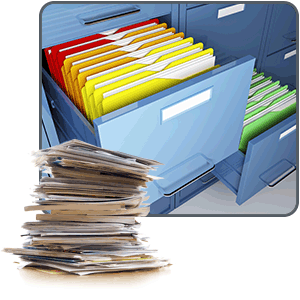Put those files away!

You do it all day everyday - filing. Filing is the act of compiling, sorting, and putting the item(s) away. In essence - organizing. However, the word filing is generally used to describe categorizing. Filing is essential and a filing system is a major timesaver.
Whether you file paper or computer documents, you need a system in place.
Paper
The computer age has not eliminated the need for paper. We still have paper everywhere! We print out our documents in the event the computer crashes. We make copies of everything. It can drive a person crazy. Where do we put these documents? How do we categorize them?
If you don't create your own system, someone in your organization will create it for you. Have you ever gone to the office and painfully searched for documents that you need to finish a report or give to your accountant? Under what heading was it filed? Whose desk is it sitting on? Was it even filed? If you don't have a system in place you will surely encounter this type of scenario at some point, or repeatedly.
Create a system. Break your organization down by category. The basic files for a small business may include: Banking, Petty Cash, Accounts Receivable (filed by customer), Inventory, Accounts Payable (filed by Supplier), etc. Accounts Payable could take an entire drawer depending on your type of business. You will have operating files, information files, legal documents, etc. These all have to be filed according to your business needs. Most documents are easy to file. Some documents may get lost in the shuffle because the person handling them may not know what to do with them. They may not ask and file it where they think it should go, or leave it in their in-basket, or worse - toss it.
Implement a system that is easy to follow. Use in/out guides so that you know where the file is when someone takes it out of the cabinet.
When files become dated, archive them. When they become redunant, shred them. Nothing is worse than a room full of dusty old file boxes. They tend to pile, break down and can lead to such a mess. Combined with other office products they can create a fire hazzard. In addition, you are losing valuable storage space.
Digital Files
Digital files created on your computer can grow right out of control if not filed correctly. Implement a system for these files as well. This way anyone can access them easily and quickly. File them the same way you file your document files. Come up with a naming convention for them. Do not use acronyms for the directory folders though - it creates confusion and you will end up with similar folders containing similar files. For example, do not name a folder with your customer invoices AR (A/R would not be too bad but you cannot use a forward slash in a folder name). If you name it AR or worse ar, someone may overlook it and create an accounts receivable folder. This is just a basic example. In your line of business, there are probably folders that are much easier to duplicate. This practice tends to have a snowball effect and clean up becomes a major chore.
Filing is important. It is one of the fundamental basics of setting up a business and maintaining order.


